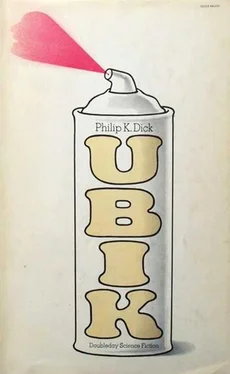“Anyhow,” Wendy said, “he’ll be closer to Ella.”
“In a way,” Joe said, “I hope we got him into the cold-pac too—” He broke off, not wanting to say it. “I don’t like moratoriums,” he said. “Or moratorium owners. I don’t like Herbert Schoenheit von Vogelsang. Why does Runciter prefer Swiss moratoriums? What’s the matter with a moratorium in New York?”
“It is a Swiss invention,” Edie Dorn said. “And according to impartial surveys, the average length of half-life of a given individual in a Swiss moratorium is two full hours greater than an individual in one of ours. The Swiss seem to have a special knack.”
“The U.N. ought to abolish half-life,” Joe said. “As interfering with the natural process of the cycle of birth and death.”
Mockingly, Al Hammond said, “If god approved of half-life, each of us would be born in a casket filled with dry ice.”
At the control console, Don Denny said, “We’re now under the jurisdiction of the Zurich microwave transmitter. It’ll do the rest.” He walked away from the console, looking glum.
“Cheer up,” Edie Dorn said to him. “To be brutally harsh about it, consider how lucky all of us are; we might be dead now. Either by the bomb or by being lasered down after the blast. It’ll make you feel better, once we land; we’ll be so much safer on Earth.”
Joe said, “The fact that we had to go to Luna should have tipped us off.” Should have tipped Runciter off, he realized. “Because of that loophole in the law dealing with civil authority on Luna, Runciter always said, ‘Be suspicious of any job order requiring us to leave Earth.’ If he were alive he’d be saying it now. ‘Especially don’t bite if it’s Luna where they want us. Too many prudence organizations have bitten on that.’ ” If he does revive at the moratorium, he thought, that’ll be the first thing he says. “I always was suspicious of Luna,” he’ll say. But not quite suspicious enough. The job was too much of a plum; he couldn’t resist it. And so, with that bait, they got him. As he always knew they would.
The ship’s retrojets, triggered off by the Zurich microwave transmitter, rumbled on; the ship shuddered.
“Joe,” Tito Apostos said, “you’re going to have to tell Ella about Runciter. You realize that?”
“I’ve been thinking about it,” Joe said, “since we took off and started back.”
The ship, slowing radically, prepared by means of its various homeostatic servo-assist systems to land.
“And in addition,” Joe said, “I have to notify the Society as to what’s happened. They’ll rake us over the coals; they’ll point out right away that we walked into it like sheep.”
Sammy Mundo said, “But the Society is our friend.”
“Nobody,” Al Hammond said, “after a fiasco like this, is our friend.”
A solar-battery-powered chopper marked BELOVED BRETHREN MORATORIUM waited at the edge of the Zurich field. Beside it stood a beetle-like individual wearing a Continental outfit: tweed toga, loafers, crimson sash and a purple airplane-propeller beanie. The proprietor of the moratorium minced toward Joe Chip, his gloved hand extended, as Joe stepped from the ship’s ramp onto the flat ground of Earth.
“Not exactly a trip replete with joy, I would judge by your appearance,” von Vogelsang said as they briefly shook hands. “May my workmen go aboard your attractive ship and begin—”
“Yes,” Joe said. “Go aboard and get him.” Hands in his pockets, he meandered toward the field’s coffee shop, feeling bleakly glum. All standard operating procedure from now on, he realized. We got back to Earth; Hollis didn’t get us—we’re lucky. The Lunar operation, the whole awful, ugly, rat-trap experience, is over. And a new phase begins. One which we have no direct power over.
“Five cents, please,” the door of the coffee shop said, remaining shut before him.
He waited until a couple passed by him on their way out; neatly he squeezed by the door, made it to a vacant stool and seated himself. Hunched over, his hands locked together before him on the counter, he read the menu. “Coffee,” he said.
“Cream or sugar?” the speaker of the shop’s ruling monad turret asked.
“Both.”
The little window opened; a cup of coffee, two tiny paper-wrapped sacks of sugar and a test-tube-like container of cream slid forward and came to rest before him on the counter.
“One international poscred, please,” the speaker said.
Joe said, “Charge this to the account of Glen Runciter of Runciter Associates , New York.”
“Insert the proper credit card,” the speaker said.
“They haven’t let me carry around a credit card in five years,” Joe said. “I’m still paying off what I charged back in—”
“One poscred, please,” the speaker said. It began to tick ominously. “Or in ten seconds I will notify the police.”
He passed the poscred over. The ticking stopped.
“We can do without your kind,” the speaker said.
“One of these days,” Joe said wrathfully, “people like me will rise up and overthrow you, and the end of tyranny by the homeostatic machine will have arrived. The day of human values and compassion and simple warmth will return, and when that happens someone like myself who has gone through an ordeal and who genuinely needs hot coffee to pick him up and keep him functioning when he has to function will get the hot coffee whether he happens to have a poscred readily available or not.” He lifted the miniature pitcher of cream, then set it down. “And furthermore, your cream or milk or whatever it is, is sour.”
The speaker remained silent.
“Aren’t you going to do anything?” Joe said. “You had plenty to say when you wanted a poscred.”
The pay door of the coffee shop opened and Al Hammond came in; he walked over to Joe and seated himself beside him. “The moratorium has Runciter in their chopper. They’re ready to take off and they want to know if you intend to ride with them.”
Joe said, “Look at this cream.” He held up the pitcher; in it the fluid plastered the sides in dense clots. “This is what you get for a poscred in one of the most modern, technologically advanced cities on Earth. I’m not leaving here until this place makes an adjustment, either returning my poscred or giving me a replacement pitcher of fresh cream so I can drink my coffee.”
Putting his hand on Joe’s shoulder, Al Hammond studied him. “What’s the matter, Joe?”
“First my cigarette,” Joe said. “Then the two-year-old obsolete phone book in the ship. And now they’re serving me week-old sour cream. I don’t get it, Al.”
“Drink the coffee black,” Al said. “And get over to the chopper so they can take Runciter to the moratorium. The rest of us will wait in the ship until you come back. And then we’ll head for the nearest Society office and make a full report to them.”
Joe picked up the coffee cup, and found the coffee cold, inert and ancient; a scummy mold covered the surface. He set the cup back down in revulsion. What’s going on? he thought. What’s happening to me? His revulsion became, all at once, a weird, nebulous panic.
“Come on, Joe,” Al said, his hand closing firmly around Joe’s shoulder. “Forget the coffee; it isn’t important. What matters is getting Runciter to—”
“You know who gave me that poscred?” Joe said. “Pat Conley. And right away I did what I always do with money; I frittered it away on nothing. On last year’s cup of coffee.” He got down from the stool, urged off it by Al Hammond’s hand. “How about coming with me to the moratorium? I need back-up help, especially when I go to confer with Ella. What should we do, blame it on Runciter? Say it was his decision for us all to go to Luna? That’s the truth. Or maybe we should tell her something else, tell her his ship crashed or he died of natural causes.”
Читать дальше








